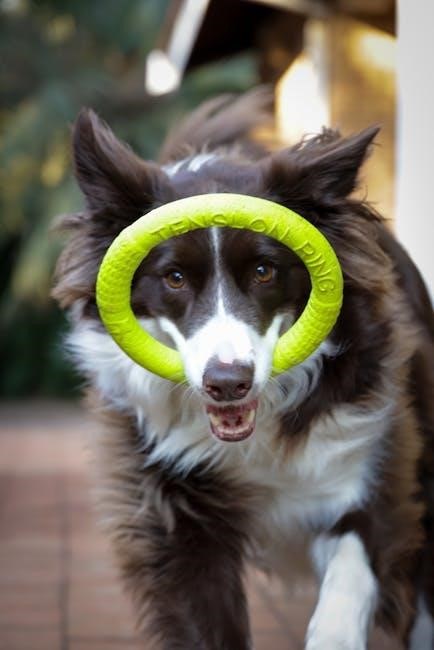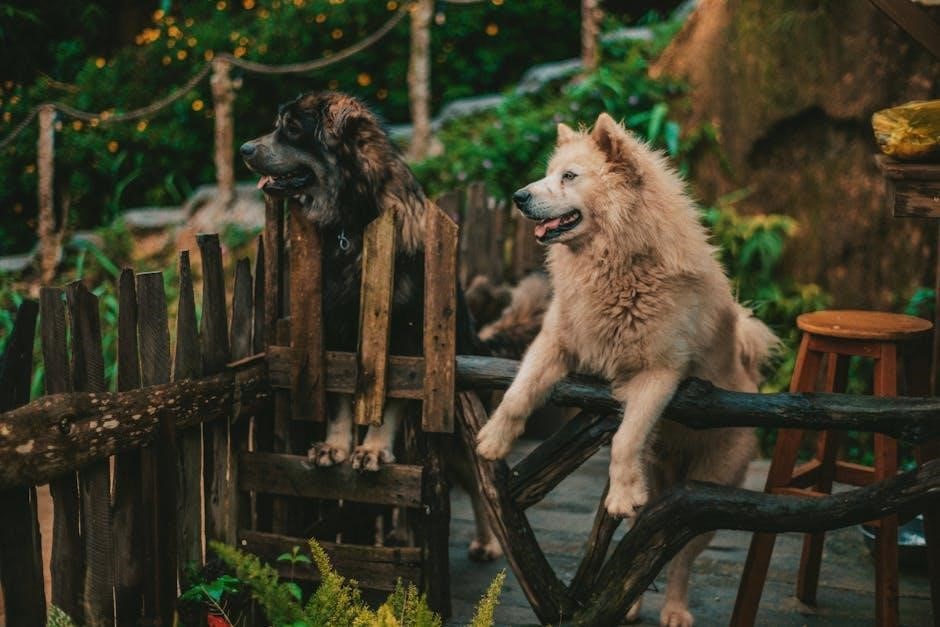Dogs can suffer severe health issues if they consume certain human foods. Chocolate, grapes, nuts, caffeine, onions, garlic, alcohol, processed foods, avocado, and raw meat are among the most toxic. Awareness is key to protecting your pet.

Common Toxic Foods for Dogs
Dogs are at risk from several human foods, including chocolate, grapes, raisins, nuts, caffeine, onions, garlic, alcohol, processed foods, avocado, and raw or undercooked meat, which can cause severe health complications if ingested.
Chocolate
Chocolate is highly toxic to dogs due to its theobromine content, which can cause cardiac issues, seizures, and even death. Dark chocolate and baking chocolate are the most dangerous forms. Keep all chocolate products out of your dog’s reach to ensure their safety and health.
Grapes and Raisins
Grapes and raisins are highly toxic to dogs, with even small amounts leading to kidney failure. The exact toxin is unknown, but their consumption can cause severe illness or death. Immediate veterinary attention is crucial if ingestion occurs.
Nuts
Nuts, particularly macadamia nuts, are toxic to dogs and can cause weakness, depression, vomiting, tremors, and hyperthermia. Other nuts like walnuts and almonds can also pose risks due to their high fat content, leading to pancreatitis. Always keep nuts out of reach.
Caffeine
Caffeine is highly toxic to dogs and can cause severe health issues. It affects the central nervous and cardiovascular systems, leading to symptoms like vomiting, restlessness, increased heart rate, and hyperactivity. In severe cases, it can result in seizures or heart failure. Common sources include coffee, tea, energy drinks, and certain medications. Even small amounts can be harmful, especially to smaller breeds. If you suspect your dog has ingested caffeine, contact a veterinarian immediately. Prevention is key—keep all caffeinated products out of reach and educate family members about the risks. Regularly check your home for potential sources of caffeine to ensure your dog’s safety. Prompt veterinary care is crucial in such cases to prevent long-term damage or fatal outcomes. Always prioritize your dog’s health by being vigilant about toxic substances in their environment.

Onions and Garlic
Onions and garlic belong to the Allium family and contain compounds that can damage a dog’s red blood cells, leading to anemia. These compounds, when ingested, can cause the red blood cells to rupture, reducing the dog’s ability to transport oxygen. Symptoms of onion or garlic poisoning in dogs include vomiting, diarrhea, lethargy, and pale gums. In severe cases, dogs may experience difficulty breathing or collapse. Even small amounts of onions or garlic can be harmful, and the effects can worsen over time if the dog is repeatedly exposed. Both raw and cooked forms of onions and garlic are toxic, as well as powdered or mixed in foods. If you suspect your dog has ingested onions or garlic, seek veterinary care immediately. Prompt treatment is essential to prevent long-term health complications. Always keep these foods out of your dog’s reach to ensure their safety and well-being.
Alcohol
Alcohol is highly toxic to dogs and can cause severe health issues even in small amounts. Dogs metabolize alcohol differently than humans, leading to rapid absorption into the bloodstream. Symptoms of alcohol poisoning in dogs include vomiting, drooling, lack of coordination, and difficulty breathing. As the condition progresses, it can result in seizures, coma, or even death. Common sources of alcohol exposure for dogs include liquor, beer, wine, and even fermented foods. If you suspect your dog has ingested alcohol, it is crucial to contact a veterinarian or a pet poison hotline immediately. Prompt treatment can help manage the toxicity and prevent long-term damage. Never intentionally give alcohol to your dog, as even small amounts can be dangerous. Keeping alcoholic beverages and products safely stored is essential to protect your pet’s health and safety.
Processed Foods
Processed foods can be particularly dangerous for dogs due to their high concentration of additives, preservatives, and unhealthy ingredients. Many contain substances like BHT, artificial colors, and high fructose corn syrup, which are not safe for canine consumption. These foods often lead to digestive issues, allergic reactions, and long-term health problems such as obesity and organ damage. Dogs may also be tempted by processed snacks, but even small amounts can trigger severe symptoms like vomiting, diarrhea, or lethargy. Some processed foods, such as those containing chocolate, caffeine, or xylitol, are especially toxic and can lead to life-threatening conditions. It is essential to keep all processed foods out of your dog’s reach and stick to a balanced, nutrient-rich diet specifically formulated for dogs. Always read labels and consult your veterinarian before introducing new foods to your dog’s diet to ensure their safety and well-being.
Avocado
Avocados are a controversial food when it comes to dogs. While they are not entirely toxic, they contain a compound called persin, which can cause vomiting, diarrhea, and gastrointestinal distress in some dogs. The highest concentration of persin is found in the skin, pits, and leaves of the avocado, making these parts particularly dangerous. Even small amounts can lead to mild symptoms, while larger quantities might result in more severe health issues. Additionally, avocados are high in fat, which can contribute to weight gain and pancreatitis in dogs if consumed regularly. It is crucial to keep all parts of the avocado plant out of your dog’s reach and avoid feeding them any portion of the fruit, even in small amounts. If you suspect your dog has ingested avocado, monitor their behavior closely and consult a veterinarian for guidance to ensure their safety and well-being.
Raw or Undercooked Meat
Feeding dogs raw or undercooked meat can pose significant health risks. These meats may contain bacteria like Salmonella, E. coli, and Listeria, which can lead to severe gastrointestinal infections in dogs. Symptoms often include vomiting, diarrhea, lethargy, and fever, and in severe cases, these infections can spread to other parts of the body, causing life-threatening complications. Additionally, raw meat may harbor parasites such as tapeworms or roundworms, which can infest your dog’s digestive system and lead to long-term health issues. Even though some pet owners believe raw diets are natural, the risks associated with bacterial contamination and parasitic infections far outweigh any perceived benefits. It is essential to stick to properly cooked, high-quality dog food to ensure your pet’s safety and overall health. Always consult your veterinarian before making any significant changes to your dog’s diet to prevent potential harm from uncooked or raw meat sources.
Symptoms of Poisoning in Dogs
When dogs ingest toxic foods, they often exhibit a range of symptoms that can vary depending on the type and amount of toxin consumed. Common signs of poisoning include vomiting, diarrhea, lethargy, loss of appetite, drooling, and trembling. In some cases, dogs may experience abdominal pain, rapid breathing, or an elevated heart rate. More severe reactions can lead to seizures, tremors, coma, or even organ failure, especially if the toxin affects the central nervous system or vital organs. In some instances, symptoms may develop gradually, while others can appear suddenly and intensely. It’s crucial to monitor your dog’s behavior closely and seek immediate veterinary care if you suspect poisoning. Early detection and treatment significantly improve the chances of a positive outcome. Always keep an eye on your dog’s health, as prompt action can save their life.
What to Do If Your Dog Ingests Toxic Food
If your dog ingests toxic food, stay calm and contact your vet immediately. Do not induce vomiting unless advised. Contact a pet poison hotline, such as ASPCA’s (888) 426-4435, for guidance.
Emergency Contact Information
If your dog ingests toxic food, contact a pet poison hotline immediately. The ASPCA Animal Poison Control Center can be reached at (888) 426-4435 (available 24/7; a consultation fee may apply); Another option is the Pet Poison Helpline at (855) 213-6680. These services provide expert advice and can guide you on the next steps. Always keep your veterinarian’s contact information handy, as they may need to see your dog urgently. In severe cases, head to the nearest emergency veterinary clinic without delay. Prompt action can save your dog’s life. Remember, these hotlines are invaluable resources for pet owners facing such emergencies. Keep these numbers accessible to ensure quick response times. Acting swiftly and seeking professional help is critical in preventing serious harm to your dog.
Preventive Measures
To protect your dog from toxic foods, it’s essential to take proactive steps; Always store potentially harmful foods out of your dog’s reach, such as in high cabinets or secure containers. Keep human food and trash strictly off-limits. Use baby gates to block access to the kitchen or dining areas during meals. Provide safe, dog-specific treats like apples, carrots, or green beans as alternatives to harmful snacks. Supervise your dog during gatherings or meals to prevent accidental ingestion of toxic substances. Train your dog to obey commands like “leave it” to discourage unwanted food intake. Educate family members, guests, and children about foods that are dangerous for dogs. Regularly review lists of toxic foods, such as those provided by the ASPCA, to stay informed. By being vigilant and prepared, you can significantly reduce the risk of your dog encountering harmful foods. Prevention is always better than dealing with an emergency. Stay informed and keep your dog safe.

Safe Food Alternatives for Dogs

Providing your dog with safe, healthy treats is crucial for their well-being. Opt for dog-specific options like carrots, green beans, and apples, which are nutritious and non-toxic. Sweet potatoes and pumpkin are excellent for digestive health. Small amounts of plain, unseasoned yogurt or cottage cheese can also be given as a protein-rich snack. Hard-boiled eggs, without the shell, make a great treat. For a special indulgence, blueberries and bananas are safe in moderation. Always ensure fruits are seedless and coreless, as seeds and pits can be harmful. Avoid processed snacks and stick to whole, natural foods. Consulting with your veterinarian can help you choose the best options tailored to your dog’s dietary needs. By offering these alternatives, you keep your dog safe and satisfied while avoiding the risks posed by toxic human foods. Always prioritize your dog’s health with informed, safe choices.